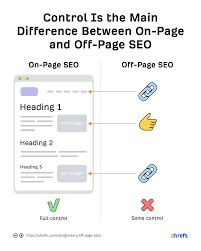The Importance of On-Page and Off-Page SEO
In the realm of digital marketing, Search Engine Optimization (SEO) is a vital tool for enhancing a website’s visibility and attracting organic traffic. Two key components of SEO are on-page and off-page optimization, each playing a crucial role in improving a website’s search engine rankings.
On-Page SEO
On-page SEO refers to the optimization strategies implemented directly on the website itself. This includes elements such as meta tags, headings, keyword usage, content quality, internal linking structure, and site speed. By focusing on on-page factors, webmasters can ensure that their website is user-friendly, relevant to search queries, and easily crawlable by search engine bots.
Key practices for effective on-page SEO include:
- Keyword research and integration
- Optimizing meta tags (title tags, meta descriptions)
- Crafting high-quality content with relevant keywords
- Improving site speed and mobile-friendliness
- Optimizing internal linking structure for better navigation
Off-Page SEO
Off-page SEO focuses on external factors that influence a website’s search engine rankings. This includes building backlinks from reputable websites, social media engagement, online reputation management, and influencer partnerships. Off-page optimization helps establish a website’s authority and credibility in the eyes of search engines.
Key practices for effective off-page SEO include:
- Building high-quality backlinks from relevant websites
- Social media promotion and engagement
- Online reputation management through reviews and testimonials
- Collaborating with influencers to amplify brand visibility
- Listings in online directories and industry-specific platforms
The Synergy Between On-Page and Off-Page SEO
While on-page and off-page SEO are distinct strategies, they work hand in hand to improve a website’s overall search engine performance. A well-rounded approach that combines both on-page and off-page optimization can lead to higher search rankings, increased organic traffic, and improved online visibility.
By focusing on creating valuable content that resonates with users while also building authoritative backlinks from reputable sources, webmasters can create a strong foundation for long-term SEO success.
In conclusion, mastering both on-page and off-page SEO is essential for achieving sustainable growth in the competitive digital landscape. By implementing best practices in both areas, webmasters can enhance their website’s relevance, credibility, and visibility in search engine results pages.
Understanding On-Page and Off-Page SEO: Key Differences, Impacts, and Strategies
- What is the difference between on-page and off-page SEO?
- How does on-page SEO impact search engine rankings?
- What are the key elements of on-page SEO optimization?
- Why is off-page SEO important for improving website visibility?
- How can backlinks influence off-page SEO performance?
What is the difference between on-page and off-page SEO?
The fundamental difference between on-page and off-page SEO lies in the focus of optimization efforts. On-page SEO involves enhancing elements directly within the website, such as content quality, meta tags, and internal linking structure, to improve search engine visibility and user experience. In contrast, off-page SEO concentrates on external factors like backlinks, social media engagement, and online reputation management to establish a website’s authority and credibility across the web. While on-page SEO ensures that a website is optimised internally for search engines, off-page SEO aims to boost a site’s reputation and relevance through external signals. Both strategies are integral to a comprehensive SEO approach that drives organic traffic and improves search rankings effectively.
How does on-page SEO impact search engine rankings?
When it comes to search engine rankings, on-page SEO plays a pivotal role in determining a website’s visibility and relevance to search queries. By focusing on on-page optimization factors such as keyword usage, meta tags, content quality, and site structure, webmasters can signal to search engines the relevance and value of their website. Effective on-page SEO not only helps search engine bots understand the content of a webpage but also enhances user experience by providing valuable information in a structured manner. Ultimately, by implementing best practices in on-page SEO, websites can improve their chances of ranking higher in search engine results pages and attracting organic traffic from users actively seeking relevant information or services.
What are the key elements of on-page SEO optimization?
When it comes to on-page SEO optimization, several key elements play a crucial role in enhancing a website’s search engine visibility. These elements include meticulous keyword research and integration to ensure content relevance, optimizing meta tags such as title tags and meta descriptions for improved click-through rates, crafting high-quality and engaging content that incorporates relevant keywords naturally, prioritizing site speed and mobile responsiveness for enhanced user experience, and structuring internal links strategically to facilitate seamless navigation for both users and search engine crawlers. By focusing on these essential elements of on-page SEO, webmasters can lay a strong foundation for better search engine rankings and increased organic traffic.
Why is off-page SEO important for improving website visibility?
Off-page SEO plays a pivotal role in enhancing website visibility by establishing credibility and authority in the digital realm. While on-page SEO focuses on optimizing content and structure within the website, off-page SEO involves external factors like building high-quality backlinks, engaging in social media promotion, and managing online reputation. These off-page strategies signal to search engines that a website is reputable and trustworthy, leading to improved search engine rankings and increased organic traffic. By leveraging off-page SEO techniques effectively, websites can expand their reach, attract a wider audience, and ultimately boost their online visibility in a competitive digital landscape.
How can backlinks influence off-page SEO performance?
Backlinks play a pivotal role in shaping the performance of off-page SEO strategies. These external links from other websites act as signals of credibility and authority to search engines, indicating that a website is trustworthy and valuable. High-quality backlinks can significantly impact a website’s search engine rankings, as they demonstrate to search algorithms that the content is relevant and worthy of recognition. By acquiring backlinks from reputable sources with relevance to the website’s niche, webmasters can enhance their off-page SEO performance, boost organic traffic, and establish their site as an authoritative voice within their industry.

